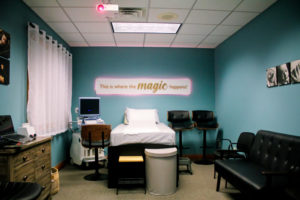Private practice
Breaking away from traditional hospital-centric care
The realm of health care is a complex and continually changing system. As technology advances and the capacity of care evolves, doctors and medical professionals are starting to break away from traditional hospital systems. Instead, they are joining independent practices to supply services within different fields of expertise. This structure, which includes specialties like cardiologists, therapists, midwives and sonographers, not only diversifies the care options available in the Fox Cities, but gives patients the opportunity to take control of their health in a more affordable, convenient and interactive way.
Taking Patient Health to Heart
Doctors and medical professionals treat and diagnose a variety of injuries, illnesses and diseases every day. While these services also take place within a hospital setting, private clinics like the Heart and Vascular Institute of Wisconsin are committed to providing excellent care with an amplified level of convenience. The center, which opened in 1968, is the area’s oldest and largest cardiology practice that focuses on preventing and treating ailments such as coronary artery disease, congestive heart failure, and abnormal rhythms and arrhythmias.
 “Private practice medicine optimizes our ability to innovate and collaborate to achieve our quadruple aim of higher quality, lower cost and excellent service in a unique, patient-friendly environment,” Larry Sobal (MBA, MHA, FACMPE), CEO of The Heart and Vascular Institute of Wisconsin, says. “Our history, size and scope attract phenomenal physicians and staff who all share a common vision.”
“Private practice medicine optimizes our ability to innovate and collaborate to achieve our quadruple aim of higher quality, lower cost and excellent service in a unique, patient-friendly environment,” Larry Sobal (MBA, MHA, FACMPE), CEO of The Heart and Vascular Institute of Wisconsin, says. “Our history, size and scope attract phenomenal physicians and staff who all share a common vision.”
Since heart and blood vessel disease prevention begins outside the hospital and in a patient’s daily life, operating within a free-standing clinic allows the institute to dispense flexible and universal treatments.
With the help of leading technologies, patients can visit the clinic for diagnostic testing and minor procedures without the unnecessary frills.
“Patients want high quality, convenience, easy access and lower costs,” Sobal says. “We try to offer as many services as possible in outpatient settings.”
By seeking such care in a more exclusive environment, patients can also easily access facilities, which is especially important for those with limited mobility. Being seen at a clinic versus a hospital may result in less anxiety overall for a patient during the course of their visit, encouraging further maintenance of health-related issues.
In private clinics, the working relationship and trust between the doctors and their patients improves tenfold.
“As the owners and operators of an independent practice, the physicians enjoy freedom and control over how they practice medicine,” Sobal explains. “This creates a patient-centric relationship where the physicians can focus on the needs of the patient, educate the patient about their current status, and reach a decision with the patient on what to do moving forward.”
Advocating for Mental Health Stability
According to the National Alliance on Mental Illness (NAMI), 1 in 5 adults in America have a mental illness, with three-quarters experiencing symptoms by the age of 24. In light of the pandemic, these statistics are climbing, making access to ample mental health care even more critical. With many hospitals around the state experiencing shortages and seeing record numbers, patients can opt to seek treatment at clinics like Rogers Behavioral Health through in-person appointments or virtual telehealth visits, from the comfort of home.
“Rogers’ practice is one step outside of the hospital level and offers a sense of community,” Molly Feldner (MSE, NCC, LPC), a licensed counselor and float therapist for Rogers Behavioral Health in Appleton, says. “Having our clinic separate provides patients a neutral, safe space where they can be open about their struggles and challenges that they face daily.”
An added benefit to having a strong outlet locally is that patients can choose to involve their loved ones in their recovery process, an instance that may not always be allowable during treatment at a hospital.
The multidisciplinary team at Rogers helps patients become the best version of themselves by teaching them to nurture their mental health. Patients routinely seek help for a variety of reasons, including depression, trauma, substance abuse and eating disorders. The ease of access on a clinical level for treatment for these conditions provides privacy and a sense of security, allowing patients to adapt and focus on their unique health goals.
“Some patients express being uneasy in a hospital setting,” Feldner says. “Our practice is positively impacted because patients give voice to having the clinic in a separate space and are willing to push themselves for a positive recovery and overall better life.”
The Birth of Innovative Services
 Clinics are now equipped to offer more than a baseline level of care. In fact, some, like Alba Birth Center in Menasha, even specialize in midwifery, support women during labor and help to deliver babies. Birth centers aim to provide a private, intimate, and home-like environment sans open-back gowns and classical elevator music.
Clinics are now equipped to offer more than a baseline level of care. In fact, some, like Alba Birth Center in Menasha, even specialize in midwifery, support women during labor and help to deliver babies. Birth centers aim to provide a private, intimate, and home-like environment sans open-back gowns and classical elevator music.
According to the National Center for Biotechnology Information (NCBI), utilizing a birth center has more than doubled since 2017, where previously 1 out of every 62 births occurred outside a hospital.
Alba Birth Center welcomes women and their families with a holistic approach. The center provides prenatal, birth and postpartum care along with lactation support and well baby visits for the first six weeks. Service begins with a free consultation, and the patient returns for a monthly checkup until their 28th week of pregnancy. Then, appointments are scheduled every two weeks until delivery, and end with supportive postpartum visits.
Marissa Hazelet, a birth assistant and DONA-trained doula for Alba, believes that birthing in a center is uplifting and leaves an influential mark on maternal health.
 “It is important for us to operate out of the hospital setting to give parents who are low-risk a place to have a natural birth without being pressured to do medical interventions,” she says. “When interventions are needed they can save lives, when they are not, it can interrupt the natural birthing cycles.”
“It is important for us to operate out of the hospital setting to give parents who are low-risk a place to have a natural birth without being pressured to do medical interventions,” she says. “When interventions are needed they can save lives, when they are not, it can interrupt the natural birthing cycles.”
Private practices like Alba provide a comfortable alternative choice to standard obstetric care. “In our clinic, every patient gets to know all of their providers and will never have a stranger in their birth room,” Hazelet explains. “Our biggest goal is to have mutual trust between patient and provider and we want to put the power back into the patients hands so they can feel supported in making their care decisions with us walking alongside them.”
An Image of Individualized Care
Other health-related businesses are taking steps toward independent practice, including prenatal imaging services like You Kiss We Tell Ultrasound in Appleton. The quaint clinic will soon celebrate its one-year anniversary of providing lasting memories to families with 2D/3D/4D and HD ultrasounds.
 For them, practicing outside of a hospital allows the clinic to offer affordable, professional imaging services without requiring insurance.
For them, practicing outside of a hospital allows the clinic to offer affordable, professional imaging services without requiring insurance.
“It is important that we can charge a lower cost up front for ultrasounds instead of having insurances and hospitals involved where they charge hundreds of dollars,” Lucas Garcia, owner of You Kiss We Tell Ultrasound, says. “Hospitals tend to just get measurements and get you out the door, but we feel finding out your baby’s gender and seeing their face for the first time should be a much more fun and cherished experience than what a hospital provides.”
Elective ultrasounds can help capture a woman’s pregnancy story, just as visiting a smaller clinic can provide a more personal experience.
“We provide just as high of quality ultrasound, if not better, as we hear often, but in a warm, home-style setting where we welcome your family and friends,” Garcia says.
You Kiss We Tell has a relaxed approach to care, and helps clients celebrate parenthood with the option to live stream their ultrasound or to save the recordings of the appointment.
“People always leave more excited about their pregnancy than when they came in,” Garcia says.
Services mimic industry guidelines, and while referrals are not necessary at the clinic, they do require a client’s doctor or midwife’s contact information.
“We don’t do any invasive ultrasounds and they are all over the belly,” he says. “Our Gender DNA tests also collect your blood with a needleless device.”
Along with using state-of-the-art ultrasound technology and equipment, the clinic aims to instill a positive and relaxing environment for care, unlike what some may experience in a hospital. “It’s much more personable,” Garcia says. “We schedule more than enough time for each ultrasound because the last thing we want is for mom to feel rushed as she admires her new baby.”
Between scheduling a routine exam, having blood work drawn, or creating an overall plan of care, clinics can offer patients refreshing flexibility and help to take control of their health. By breaking away from the traditional hospital setting, private practices shift focus back to patients and embrace their individual needs. Even more, they promote an evolving system of care that maintains affordably, encompasses convenience and remains transparent and interactive.










Leave a Comment